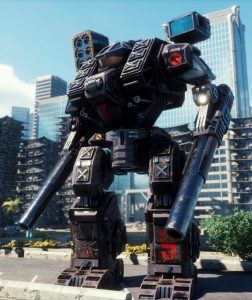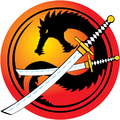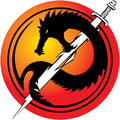Internal Security Force
This article needs to be updated with material from Handbook: House Kurita, Second Succession War (sourcebook). Once these titles clear the Moratorium period, or if they already have, please consider revisiting this article and updating it with the new material. |
This article may require cleanup to meet BattleTechWiki's quality standards. The specific problem is: review needed. |
Internal Security Force | |
|---|---|
| Organization Profile | |
| Type | Intelligence Agency |
| Parent Organization | Draconis Combine |
| Headquarters | Luthien |
Contents
Overview[edit]
The Internal Security Force (ISF) is the Draconis Combine's official spy agency and secret police force. Though it has existed since the Combine's founding, only recently has its internal organization come to light.[1][2]
The organization is often regarded as the reincarnation of demons by the other Successor States but it follows only the tradition of its founder. The Draconis Combine was created sometimes with underhanded tactics like brute force, espionage and others too.[3] The members of the ISF believe that the Dragon will at some point rule over the entire humanity and every obstacle, even Coordinators, will overcome to reach that goal.[3] The enemies of the Dragon fear the effectiveness of the ISF. The agents of the agency are loyal to the death. They know the death will come some day and everyone is ready to sacrifice himself for the higher good of the Combine.[4]
Status in 3050[edit]
Until the arrival of the Clans, the agency had only one task: to break the alliance between House Steiner and House Davion by any means. Should that happen the next logical step was to destroy both realms.[4] With their invasion, the Clans became an enemy to all Inner Sphere powers. That changed the entire situation and a temporary ceasefire with the other agencies took place. After the epic campaign on Tukayyid, the situation changed once more. Some members of the ISF tried to convince the new Coordinator to take the chance for another invasion into the Federated Commonwealth, but Theodore Kurita had other priorities. He had the intention to know the route of the invaders with the goal to devastate their homeworlds.[4] The Combine faced three equal, strong, new enemies: Clan Smoke Jaguar, Clan Nova Cat, and Clan Ghost Bear, which seemed to be unstoppable. ISF operatives gathered all available information and sent it back into the Combine. With that knowledge it became possible to beat Clan Smoke Jaguar at Wolcott.[4] The successful defense of Luthien against the Clans was another outstanding example;[4] it showed the leaders of the ISF and Draconis Combine Mustered Soldiery that cooperation with former enemies could lead to unexpected results. The nonaggression pact (signed on Outreach) with House Steiner-Davion holds at the moment. But the assassination of the FedCom leader (Melissa Steiner-Davion) increased the alert level of the ISF once more.[4]
- Missions of the ISF
- Gather all available information about the Clans and understand how to counter them effectively[4]
- Capture Clan warriors to get information, with the use of brutal questioning techniques if needed[4]
- Supply resistance movements on Clan held worlds, gather information about valuable targets, and sow chaos whenever possible among occupation forces[5]
- Maintain their established spy networks quietly, only with the permission of the Coordinator are actions allowed[5]
- Examine all messages transmitted by ComStar for possible information about Clan activities[5]
The agency prepared itself for the renewal of hostilities with the Clans. For that operation several plans would be activated:
History[edit]
Beginnings[edit]
The roots of the agency could be tracked back to the early years of the reign of Shiro Kurita.[5] He established a force with the goal to know what his enemies thought and to have the capabilities to use operatives for tasks that the normal military couldn't reach. The organization was very effective. Shiro was informed about possible troop strength, weaknesses and so on. The success of the rapid expansion of his realm was the result of such operations.[5]
After the creation of the Draconis Combine in 2330, Shiro expanded the organization into its shape of today. With the conquest of the Rasalhague Republic the agency were put to test. The ISF supplied the Coordinator for over 48 months with valuable information, but the ignorance of the operatives had catastrophic results. The agency get no notice about the anti-Combine movement on New Bergen when the insurgents captured a large supply depot. With this matériel the underground movement harassed the occupiers for the next four years.[5] Another example was the failed attempt to kill members of the Kurita clan by Rasalhague rebel forces. The Coordinator killed himself as a consequence in 2376.[6]
Von Rohrs Dynasty[edit]
In the early twenty-fifth century the ISF regarded themselves as the keepers of their founder's heritage. The son of the new Coordinator made plans to kill his father, finding him selfish and only concerned with himself. The ISF's leaders knew of the plot, but did nothing to stop it. That decision would haunt them in the future.[6]
An illegitimate child of Nihongi Kurita conspired successful against the ruling Coordinator Robert Kurita. The agency took no action to prevent the assassination. Nihongi started a war against the Lyran Commonwealth and captured vast territories in the Tamar Pact. But a purification took place within the ISF. All agents considered disloyal were executed.[4]
The Terran Hegemony had created a new weapon which changed the modern warfare forever: the BattleMech.[6] All other states in the Inner Sphere tried everything to obtain the new technology to but so far only the Lyran Commonwealth was able to get it during a successful raid at the Hesperus II facility.[6] The ISF, lacking the manpower after the cleansing, nevertheless tried to acquire the technology. The DEST were created at the same time under the authority of the Director of the ISF. The DEST raided the Lyran world Coventry in 2461 and captured the technology to build 'Mechs for the Draconis Combine.[6]
The ISF took matter into its own hands, deciding the ongoing execution of its members was a step too far. Elements of the organization helped a relative of the surviving Kurita clan to overthrow the terror reign of the Von Rohrses.[6]
Star League Era[edit]
The ISF manipulated events in the early twenty-sixth century once more. Coordinator Martin McAllister left no heir and the agency arranged the marriage of McAllister's daughter with a Kurita of the original line.[7] With the birth of Hohiro Kurita his father died under mysterious circumstances (rumors suggest the involvement of the ISF).[7] Siriwan McAllister-Kurita build over the next 4 decades a power base for her son. When Hohiro became the new Coordinator he used other methods as its forefathers. He led the Combine into the Star League. The ISF and all other parts of the Combine were convinced by the propaganda that the Kurita Clan would one day rule over the entire Inner Sphere as First Lord.[7]
The reign of Leonard Kurita is a dark spot in the Star League era. Because a guard of the First Lord was killed by the Kurita when he was drunk. Realizing what he had done Leonard get back to Luthien where he tried to prepare the Combine for the coming war with the Star League. The ISF know that the Dragon could not survive such a conflict and removed the Coordinator through their own method effectively.[7]
The new Coordinator increased the budget and power of the ISF for one goal. To rebuild the society of the Combine from its foundation along historical Japanese feudal structures. All aspects which was regarded as anti-Combine were removed in favor of cultural conformity.[7] That terror reign remained in effect even after the death of Urizen II.[7]
Fall of the Star League[edit]
In the late twenty-eighth century the once peaceful Inner Sphere was at the brink of war. The DCMS was under the scrutiny of the ISF and the Coordinator wait for the right moment to get the SLDF off guard but Amaris was faster. The Combine cooperated with the Usurper because Amaris took Drago Kurita as hostage. The DCMS provide military aid, because the ISF supplied vital military information about the SLDF movements.[7] The actions of the Kurita ruler were regards as treason on the Star League. The hostages were killed in the last steps of the liberation of Terra from the Amaris terror reign.[7] Kerensky gathered his troops with the goal to leave the Inner Sphere because he foresaw the coming war between the House lords about the shattered Star League. After the disappearance of the SLDF the era of the Succession Wars began.[7]
Succession Years[edit]
The success of the early years of the First Succession War could explain by the fact that the ISF get notice of the weakened Davion border. The AFFS relocated massive troop strength to the Capellan border. The son of the Coordinator used the circumstances to concentrate a large portion of troops in the Galedon district.[6] The DCMS captured several planets during that time. But with the assassination of Minoru Kurita on Kentares IV the tide turned after the happening of the Kentares IV massacre by DCMS troops. The madness of the Kuritan ruler went too far when he received a toy soldier with an SLDF uniform; he lost his mind completely.[8]
Yoguchi Kurita was the new ruler of the Combine and put the ISF under control of the DCMS. That decision cost him his life.[8] The ISF doesn't prevent the female Lyran assassin Snow Fire to kill Yoguchi in his sleep.[8]
The surviving siblings of Yoguchi fought against each other for control of the Draconis Combine. That era is known as the Shadow Wars.[7]
Shadow War[edit]
Roweena Kurita used her influence of the ISF director Malcom Katsuyori to increase the power of the agency when they allowed the Internal Security Force entrance into her PRE (People's Reconstruction Effort). She used the PRE as cover to increase their influence within the society. Thus started a shadow war where Roweena secretly jousted with Coordinator Miyogi for influence and support of the generals of High Command. When the Third Succession War ended, Coordinator Miyogi Kurita started a secret investigation of the ISF to see how far his sister Roweena had corrupted the agency. Miyogi came out on top when nephew Taragi Kurita supported him instead of Roweena. Neither knew Taragi had his own plans. A purge of ISF was started to rid of agents sympathetic to Roweena, and several hundred agents lost their lives. The PRE was eradicated, but the surviving supporter of Roweena Kurita went underground, and spread rumors that the Coordinator Miyogi had betrayed the Combine to the Federated Suns. In reality, Taragi was manipulating the situation to benefit himself, with advice from Roweena. When Miyogi appointed his son Jon Kurita to command the Davion front even though Taragi made himself seem the obvious choice, Miyogi's fate was sealed. After several losses to the Federated Suns, a fanatical soldier killed Coordinator Miyogi Kurita with a suicide bomb. Jon Kurita was imprisoned and executed after a mock trial, leaving Taragi as the surviving senior Kurita to ascend to the position of Coordinator. However, Taragi suddenly died in 2907, leaving his son Shinjiro to succeed him as Coordinator.
The Shadow War ended with the signing of Davarapala Accords in 2921 which included stipulations that the ISF Director become a member of High Command and the agency was granted more autonomy.[8] The Accords was signed by the new Coordinator Shinjiro Kurita and ISF Director Clarissa Indrahar and approved by her Council of Five.[9]
Conflict with ComStar[edit]
Necess Kurita is the first born child of Coordinator Shinjiro Kurita. However, she chose a path of healing and medicine, rather than a path of martial arts, leaving that to her younger brother Hugai Kurita. She frequently traveled to the other Great Houses, causing her father great displeasure. Things did not change when her father died and her brother Hugai became Coordinator. Then Necess chose to join ComStar to further hear learning as a medical archaeologist. Coordinator Hugai consider this "recruiting" as meddling in Combine's internal affairs, but ComStar did not back down. Necess passed the tests and became an acolyte, and received special dispensation to serve her appointment on Luthien. ComStar assigned two ROM agents to watch over her, and ISF responded with 6 of their own agents. In November 2931, the two sides exchanged fire. The two surviving ISF agents kidnapped Necess and took her back to the palace. At Coordinator Hugai's orders, ISF imprisoned her in a heavily guarded remote palace wing. ComStar responded by recruiting several regiments worth of Mercenary Units and authorized Precentor Hendriks to negotiate backed up by threat of full interdiction and threat of force. Eventually Necess Kurita and Precentor Hendriks were allowed to leave peacefully. This became known as the Necess Kurita Affair.
Takashi and Theodore[edit]
Takashi Kurita used the agency as his tool to fortify his power base. The new director Subhash Indrahar was a close friend to the Coordinator. He was also the negotiator for the Concord of Kapteyn. The alliance was weakened by the fanatical hate for mercenaries of the Coordinator. The rift expanded in the following two decades further. They were neutral and supported the efforts of Theodore to strength the Dragon. Operatives of the ISF played a vital part in the creation of the Ghost regiments and the agreement with ComStar to grant the Rasalhagian people independence in exchange for downgraded ComStar matériel to rebuild the DCMS.
The ISF changed their field of work with the arrival of the Clans. They were informed of the attempt to invade Luthien by the Clans and prevent the ROM operatives during Operation Scorpion to seize the vital HPGs. The concentration of the Clan threat in combination of the reforms at many levels led to the growth of the Black Dragon Society. The members regard themselves as the true elite of the Combine.
After Theodore Kurita succeeded his father in 3054, he enacted a number of reforms that concerned very conservative elements of Draconis society. In an attempt to appease these factions, Theodore applied Japanese names to many organizations that never had them before, including the branches of the ISF. Prior to Coordinator Theodore, the ISF was sometimes known as Metsuke, or All-Seeing Eyes.[10] This name was later assigned to one specific ISF branch.
Kokuryu-kai[edit]
The first overt move of this group was an assault on Towne, a Federated Suns planet. The ISF then purged the DCMS, believing they had put an end to the Society. Instead, they tried to get back their lost honor with the failed assassination attempt on the Coordinator during a parade at Luthien. This time the involvement of the high-ranking DEST member was critical, because the agents used the machines of mercenaries for the task. The following purge of the ranks was brutal.
The Dragons used their resources to hire mercenaries for a covert assault of Lyons, the attack on Robinson during the FedCom Civil War, and also the failed invasion attempt of Alshain which was followed by the Dominion War as a result. The agency was in bad shape, due to restricted resources and low manpower.[11]
Subhash Indrahar was the Director of the ISF for several decades during the time of Takashi Kurita. He is eventually succeeded by his adopted son, Ninyu Kerai Indrahar.[12] He would die in first year of the Jihad and would be succeeded by 3068 by Shakir Jerrar.[13][14]
Serving in the ISF requires attending the Internal Security College.
Command Structure[edit]
Officially the Coordinator is the head of the ISF but in reality the Director of the agency is the second influential single person throughout the Combine. Within the command structure are five individuals who are the aides for the director. Each of the agents have the capabilities to lead the ISF for an interim term until a new Director is selected by the Coordinator.[15] The common operative is unknown to the society of the Combine and also to the enemy. That circumstances led to a better information base because no one knows if he speaks to an ISF operative. On Clan-held worlds the agents act on their own capabilities to disrupt the operation of the enemy.[15]
Branches[edit]
Keeping with the Combine's fascination with the number five,[16] the Internal Security Force is divided into five branches.[2] The sixth branch of the ISF is an unofficial group created by the ISF Director.
- Mononokete (Ghost Hands): Formerly known as the Covert Operations Division this is the "active intelligence" branch. Agents are trained over two years in a manner similar to DEST team members before they get active mission assignments.[17] They typically operate in smaller groups and in deep cover assignments. Their focus is directed at external threats, be it a sabotage mission, assassination, or monitoring foreign visitors as a liaison officer. These agents are not used to resolve internal matters.
- Mokonete (Guiding Hands): This is the branch most people think of when they think "ISF". Formerly known as the Internal Security Division, Mokonete agents are responsible for identifying foreign intelligence agents and eliminating them. Their other focus is finding and reeducating dissident citizens.[18]
- Koe No Ryu (Voice of the Dragon): Previously called the Propaganda Division. With an agent on the board of directors of every Combine media concern, the Voice of the Dragon is the most benign branch of the ISF. The agents of this branch limit their activities to reporting Inner Sphere and Combine events in a manner consistent with the wishes of the Kurita family. The branch also has the task of creating resistance movements on occupied Combine worlds.[18]
- Metsuke (All Seeing Eyes): Previously known as Intelligence Gathering and Analysis Division. The agents of this branch are the passive observers, infiltrators, and sleeper agents who see everything. They do not act themselves, but provide information to the analysis section, which may activate agents of other branches, or DEST commandos to eliminate a threat. The Metsuke owns a small fleet of JumpShips with the best surveillance equipment available on board. These vessels have the capability to gather information even from jump points.[17]
- Draconis Elite Strike Team: Though technically not a branch of the ISF, the DCMS MechWarriors assigned to this branch frequently provide the "muscle" needed to eliminate ISF-identified threats. Members of these teams are the equal of the LIC Loki teams or the DMI's Rabid Foxes. Before becoming a member of the DEST every apprentice must survive the initial test. Then after 48 months of training and indoctrination. The estimated numbers were during the 3050s between 5000 and 6000.[19] They were not given a Japanese name because their branch has such a fearsome reputation across the Inner Sphere. Some of these operatives were seduced by the arguments of the Kokuryu-kai, leading several of them to revolt against the Coordinator.[20]
- Musukosan No Ryu (Sons of the Dragon): Not an official branch of the ISF, this group of agents was formed by Subhash Indrahar during his tenure as the head of the ISF.[21][22] They were fanatically loyal to the Director, carrying out secret missions that no one knew about. At one point, Theodore Kurita was offered membership in the organization.[23] Ninyu Kerai Indrahar, Subhash's adopted son and friend of Theodore Kurita,[24] later controlled the group.[25] In 3028, Jerry Akuma was under consideration for membership before his mishandling of Wolf's Dragoons compelled the Director to order his death.[26]
The ISF has a complex relationship with the Combine's unofficial intelligence service, the Order of Five Pillars (O5P) headed by the Keeper of the House Honor. At times the two agencies respect and complement each other well, but at other times in the Combine's history the two agencies have engaged in a series of covert wars.
Ghost Regiments[edit]
The creation of the Ghost units in the aftermath of the Fourth Succession War gave Theodore Kurita a new tool.[27] While the members lacked the advanced training of the common agent their survival in the underworld gave them equivalent skills. The Coordinator used the network of the yakuza to supply resistance movements on Clan controlled worlds and they provide also an alternative information base when needed.[27]
The yakuza developed unusual ways to fight its enemies. The 'Mech forces of the units are from former mercenary who disappeared without a trace suggest some rumors. The units are used in situations when regular forces would have trouble because of their honor bound actions. The yakuza had no such ethical restrictions and used every possibility to reach their goal.[27]
The potential of the Ghost Regiments is well known. The successful escape of the Dragon's heir from Edo with the help of the yakuza is one impressive example.[27]
Headquarters[edit]
Among the many secret bases within the Draconis Combine two are regarded as HQ to the organization. One on New Samarkand and the other on Luthien. The complex on New Samarkand can hold a maximum of 20,000 people and in an event of an attack with atomic, biological or chemical weapons the base could be sealed within 120 seconds.[28] The complex is defended by 6 'Mech companies. The only access point to the HQ is by a system of shuttle cars which also connect the ISF college with a spaceport.
The security measures are tight. On the ground the complex is surrounded with a chemical which destroys all material immediately. Should an aircraft enter air space within 200 km of the HQ the aircraft will be destroyed without warning.[28]
Luthien houses also an HQ the near the Imperial City.[28] The structure could withstand all possible attacks and is also heavily guarded. The Tactical Command Center on Pesht was built to mimic the SLDF Brian Cache but was soon abandoned by the military. The DEST acquired it for the training of new members.[27] The defenses of the Center are equal if the other bases. It has no direct road to it. A network of sensors and automated weapons guard it against all hostile forces. The center's air space is guarded by weapons platforms in low orbit above the Command Center.[28] The training for the candidates is brutal. Five trainees make up a team. When they graduate successfully they stay together.[28]
ISF Uniforms and Insignia[edit]
References[edit]
- ↑ House Kurita (The Draconis Combine), p. 99: "The ISF is not included in any Ministry. Its doings are shrouded in such secrecy that it officially does not exist."
- ↑ 2.0 2.1 A Guide to Covert Ops, p. 52: "Internal Security Force"
- ↑ 3.0 3.1 Intelligence Operations Handbook, p. 48
- ↑ 4.0 4.1 4.2 4.3 4.4 4.5 4.6 4.7 4.8 Intelligence Operations Handbook, p. 49
- ↑ 5.0 5.1 5.2 5.3 5.4 5.5 5.6 5.7 5.8 Intelligence Operations Handbook, p. 50
- ↑ 6.0 6.1 6.2 6.3 6.4 6.5 6.6 Intelligence Operations Handbook, p. 51
- ↑ 7.0 7.1 7.2 7.3 7.4 7.5 7.6 7.7 7.8 7.9 Intelligence Operations Handbook, p. 52
- ↑ 8.0 8.1 8.2 8.3 Intelligence Operations Handbook, p. 53
- ↑ House Kurita (The Draconis Combine), pp. 80–81: "The ISF Since the Shadow War" & "Shinjiro and the ISF"
- ↑ House Kurita (The Draconis Combine), p. 49
- ↑ A Guide to Covert Ops, pp. 49–51
- ↑ Technical Readout: 3058 Upgrade, p. 146
- ↑ Jihad Secrets: The Blake Documents, pp. 76–77: Shakir Jerrar's profile - Includes replaced Ninyu Kerai Indrahar in '68
- ↑ Masters and Minions: The StarCorps Dossiers, p. 18: Shakir Jerrar profile listing noted his succession
- ↑ 15.0 15.1 Intelligence Operations Handbook, p. 55
- ↑ House Kurita: The Draconis Combine, p. 117
- ↑ 17.0 17.1 Intelligence Operations Handbook, p. 57
- ↑ 18.0 18.1 Intelligence Operations Handbook, p. 56
- ↑ Intelligence Operations Handbook, p. 59
- ↑ Black Dragon
- ↑ Heir to the Dragon, p. ??[citation needed]
- ↑ Handbook: House Kurita, p. 123: "Musukosan No Ryu"
- ↑ Heir to the Dragon, p. ??[citation needed]
- ↑ Heir to the Dragon, p. ??[citation needed], Ninyu Kerai is the ISF officer assigned to the Legion of Vega when Theodore takes command
- ↑ Black Dragon, p. ??[citation needed]
- ↑ Wolves on the Border, p. ??[citation needed]
- ↑ 27.0 27.1 27.2 27.3 27.4 Intelligence Operations Handbook, p. 60
- ↑ 28.0 28.1 28.2 28.3 28.4 Intelligence Operations Handbook, p. 61










